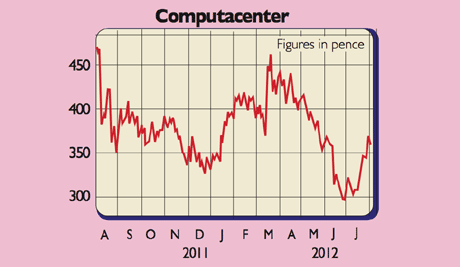Get the latest financial news, insights and expert analysis from our award-winning MoneyWeek team, to help you understand what really matters when it comes to your finances.
You are now subscribed
Your newsletter sign-up was successful
Want to add more newsletters?

Twice daily
MoneyWeek
Get the latest financial news, insights and expert analysis from our award-winning MoneyWeek team, to help you understand what really matters when it comes to your finances.

Four times a week
Look After My Bills
Sign up to our free money-saving newsletter, filled with the latest news and expert advice to help you find the best tips and deals for managing your bills. Start saving today!
Between 2007 and 2011, Computacenter, Britain's largest IT services provider, saw profits grow by an average of 19% a year and dividends by 17% a year. Yet its shares have been hammered over the past three months, following news that the firm will incur extra costs in order to support five big new contracts. I think this plunge is an overreaction.
Firstly, Computacenter has evolved from being a simple equipment provider to becoming a provider of more elaborate services. These include updating software, providing helpdesk facilities, maintaining equipment and other IT support. This unit now accounts for 30% of revenues. If you strip out pass-through' revenues from hardware sales (whereby Computacenter buys equipment on the behalf of clients without profiting from the deal), then this figure climbs to more than 75%.
With the group's contract base growing rapidly, its earnings quality can only improve further (as the more profitable and predictable services division grows to account for a larger proportion of revenues).
MoneyWeek
Subscribe to MoneyWeek today and get your first six magazine issues absolutely FREE

Sign up to Money Morning
Don't miss the latest investment and personal finances news, market analysis, plus money-saving tips with our free twice-daily newsletter
Don't miss the latest investment and personal finances news, market analysis, plus money-saving tips with our free twice-daily newsletter
Secondly, the group has successfully diversified away from its home market into continental Europe, where demand has been stronger. In Germany, clients include manufacturers, chemical makers, and pharmaceutical firms (such as Bayer, BMW and Daimler). In Britain there's more of a City bias towards the like of Barclays and Lloyds. The firm also owns smaller units in France and Belgium.
Thirdly, corporate demand for upgrades to Windows 7 is accelerating. This has been prompted by Microsoft ending its support for Vista: it will no longer provide automatic fixes or online technical assistance for the system, and will end its support for XP in 2014.
Computacenter (LSE: CCC), rated a BUY by Panmure Gordon

The firm issued a profit warning a couple of months ago, but this should be seen as a temporary blip. The board has spent £7m recruiting and training 700 extra staff, but this is leading to greater customer satisfaction in the firm's German service division. Sales leapt 8% in the first half, with sales of services up 15%.
City analysts expect 2012 turnover and underlying earnings per share (EPS) of £3bn and 37.8p respectively, rising to £3.1bn and 43.25p in 2013. That puts the shares on a price/earnings (p/e) ratio of 9.2. The 4.2% dividend yield is twice covered and bolstered by net funds of £79.3m. I value the stock on an eight times earnings before interest, tax and amortisation (EBITA) multiple. Adjusting for the cash pile gives a value of 425p a share.
Risks include poor contract management and currency fluctuations. However, until the recent hiccup, the management team had a good track record and it has shown it can deliver even in tough climates. Demand should be maintained by the debut of Windows 8, along with the growing importance of cloud computing. Panmure Gordon has a 428p price target, with interims scheduled for 31 August.
Rating: BUY at 342p (market cap £525m)
Paul Hill also writes a weekly share-tipping newsletter, Precision Guided Investments. See www.moneyweek.com/PGI , or phone 020-7633 3634.
Get the latest financial news, insights and expert analysis from our award-winning MoneyWeek team, to help you understand what really matters when it comes to your finances.
Paul gained a degree in electrical engineering and went on to qualify as a chartered management accountant. He has extensive corporate finance and investment experience and is a member of the Securities Institute.
Over the past 16 years Paul has held top-level financial management and M&A roles for blue-chip companies such as O2, GKN and Unilever. He is now director of his own capital investment and consultancy firm, PMH Capital Limited.
Paul is an expert at analysing companies in new, fast-growing markets, and is an extremely shrewd stock-picker.
-
 New PM Sanae Takaichi has a mandate and a plan to boost Japan's economy
New PM Sanae Takaichi has a mandate and a plan to boost Japan's economyOpinion Markets applauded new prime minister Sanae Takaichi’s victory – and Japan's economy and stockmarket have further to climb, says Merryn Somerset Webb
-
 Plan 2 student loans: a tax on aspiration?
Plan 2 student loans: a tax on aspiration?The Plan 2 student loan system is not only unfair, but introduces perverse incentives that act as a brake on growth and productivity. Change is overdue, says Simon Wilson